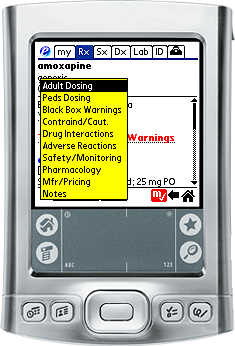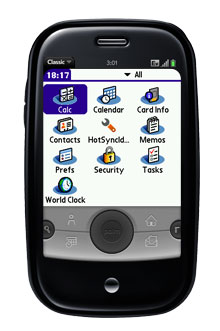Mobile computing platforms have become somthing of a hot topic lately, especially in healthcare. What used to be something used almost exclusively by business people and gadget geeks is now mainstream among the average consumer. And to that end, mobile technology is starting to creep into the healthcare industry in large part due to the ever growing list of mobile devices, i.e. smartphones and tablets. Of course the iPad has been at the center of the discussion because it has been embraced by healthcare practitioners and has forced its way into many healthcare IT departments for better or worse. Not a day goes by now when I don’t see several physicians throughout the hospital carrying an iPad. Before the iPad it was the iPhone. See a trend here? I do.
(more…)
Tag: Palm OS
-
What’s the best mobile operating sytem for pharmacy?
-
Epocrates beta for webOS
It looks like Epocrates beta is available for the Palm webOS platform. Check out the video below to get the gist for the look and feel of the app.
I don’t use Epocrates myself. My mobile drug information resources of choice come from Lexi-Comp. However, Epocrates is a very popular and highly respected resource among healthcare professionals.
Unfortunately Palm and the webOS don’t appear to have a good long-term prognosis in the smartphone arena. I’ve been reading various reports that Palm may be on its way out secondary to the iPhone, BlackBerry and newer android devices. That’s really too bad. I’ve been a big fan of the Palm operating system since its inception back in the 1990’s. In fact, I would be using a Palm Pre today if it would have been available through Verizon when I purchased my DROID.
I’d love to talk with someone at Palm about building an 8-10†slate tablet device running webOS. The simplicity of the operating system and the ability to really have multiple applications open at once is very appealing. Consider that you can also run legacy Palm OS software on webOS-based devices via emulator software like Classic from Motionapps, and you really have something to like. I fear that this is only a dream, however, as I haven’t heard a peep about anything from Palm even remotely resembling a tablet device.
So, Palm, if you ever feel the need to build a tablet device please give me a call. I have some ideas for you.
-
Epocrates in the news this week
 Epocrates is a suit of mobile medical reference material, with their drug information application being the most popular. The applications are available for a variety of mobile devices including Palm, Windows Mobile, BlackBerry, and of course the iPhone. Despite the popularity of Epocrates I still think Lexi-Comp offers better products for mobile devices.
Epocrates is a suit of mobile medical reference material, with their drug information application being the most popular. The applications are available for a variety of mobile devices including Palm, Windows Mobile, BlackBerry, and of course the iPhone. Despite the popularity of Epocrates I still think Lexi-Comp offers better products for mobile devices.FierceMobileHealthcare: “Epocrates: Nurses prefer Palm but physicians love the iPhoneA recently released survey from mobile healthcare software developer Epocrates indicates that nurses still prefer Palm PDAs and smartphones for viewing Epocrates reference tools, though the iPhone/iPod touch and BlackBerry platforms are gaining. But in an interview with FierceMobileHealthcare last week, Michelle Snyder, Epocrates’ senior VP for subscriber business, said that the iPhone is far and away the most popular device among physicians.†– The article goes on to say that Epocrates is gaining “more than 300 new docs a day on the iPhone“.No surprise there.
Medical Smartphones: “Epocrates has announced that they will be phasing out support for older Palm OS and Windows Mobile/Pocket PC devices. Specifically, older devices, including those with Palm OS less than 5 and Pocket PC 2002 OS, will lose support. If you have a Pocket PC, go into Settings, and then click on “About” to see what version you’re running. Some older devices (like some of the HP iPaq models) run Pocket PC 2002.†– This is interesting, but pretty much irrelevant. I think most healthcare professionals using mobile technology as a reference device won’t even notice the loss of support for these older devices.
-
Palm OS aficionados can continue to run their old software on the Palm Pre.
 MotionApps has a piece of software for the Palm webOS called Classic. It is basically an emulator that allows webOS-based devices like the Palm Pre to run legacy Palm OS software. The benefits are obvious: you have access to tons of software and it allows you to hold onto your old Palm OS apps just a little bit longer. Classic creates a virtual Palm environment on the Palm Pre, similar to what VMware’s Fusion software does with Windows on the Mac.
MotionApps has a piece of software for the Palm webOS called Classic. It is basically an emulator that allows webOS-based devices like the Palm Pre to run legacy Palm OS software. The benefits are obvious: you have access to tons of software and it allows you to hold onto your old Palm OS apps just a little bit longer. Classic creates a virtual Palm environment on the Palm Pre, similar to what VMware’s Fusion software does with Windows on the Mac.Because the emulator runs inside webOS, the Palm created on the Palm Pre doesn’t have hardware buttons; however all the normal Palm buttons are available on the screen. You can continue to utilize all the basic Palm functionality, including your calendar, contacts, and memos. In addition, MotionApps is working on a software update that will allow users to HotSync the emulated Palm. I don’t know when the update will be available, but you can follow the MotionApps blog here.
Classic looks like a great piece of software, and for only 30 bucks you really can’t go wrong. If only Palm would have been smart enough to use Verizon as their exclusive carrier, or vice versa, I think I’d be using a Palm Pre right about now.
-
“What’d I miss?” – Week of August 16th
As usual there were a lot of things that happened during the week, and not all of it was pharmacy or technology related. Here’s a quick look at some of the stuff I found interesting.
(more…)